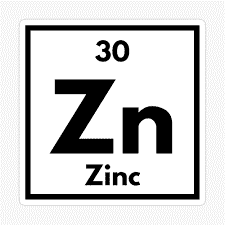Did you know that zinc is required as a cofactor for over 100 enzymatic reactions? It also has the highest concentration in muscle and bone and found in almost all of the cells in the body. By far, it is involved in way more bodily functions than any other minerals. Its key role is a part of digestive enzymes, meaning zinc is important for a happy gut! This makes it vital in the function of so many bodily processes, including that of the skin and hair.
Zinc is a micromineral and the body requires doses of it daily as it is not stored, nor made in the body. We get zinc from food or in some cases supplementation. It’s a big immune system player so can also affect how you bounce back from sickness or colds. Zinc also plays a role in insulin synthesis, so lowering blood sugar and prevent diseases like diabetes.
Did you know? When supplemented in large doses, zinc and iron can compete for absorption.
There is a possibility you could be deficient in zinc, so look out for these signs and symptoms:
- Loss of appetite and digestive function
- impaired immunity
- skin and eye lesions
- slow wound healing
Where can you find zinc?
Zinc is found in an abundance of food, but foods containing high doses should be consumed daily to get your recommended amount such as:
- oysters
- lamb shank
- beef
- pumpkin seeds’
- crab
- tasty cheese
How much zinc do you require each day?
- Adult men need the most zinc sitting at 14mg
- Adult women require 8mg
- Pregnant women require 10-11mg and during breastfeeding require 11-12mg
- Young adult boys require 13mg
- Young adult girls need 7mg
- Under 13 years the amount ranges from 2mg – mg dependant on age
How is it used topically?
Topically, zinc oxide is an ingredient is many sunscreens which provides a physical barrier from UVA/UVB rays. The FDA (Food and Drug Administration of the USA) has reported zinc as safe and effective for use in skincare products. Zinc as a product applied to the skin has many more benefits – its anti-inflammatory action to reduce redness and increasing healing. As well as its anti-bacterial action to reduce sensitivity and air in skin redness, making it ideal for all skin types, especially sensitive. Zinc is also baby safe and children friendly!
Is it time to check on your zinc levels? If so, you could be on your way to a happier skin and body!
By Riley McDonald
Dermal Therapist

